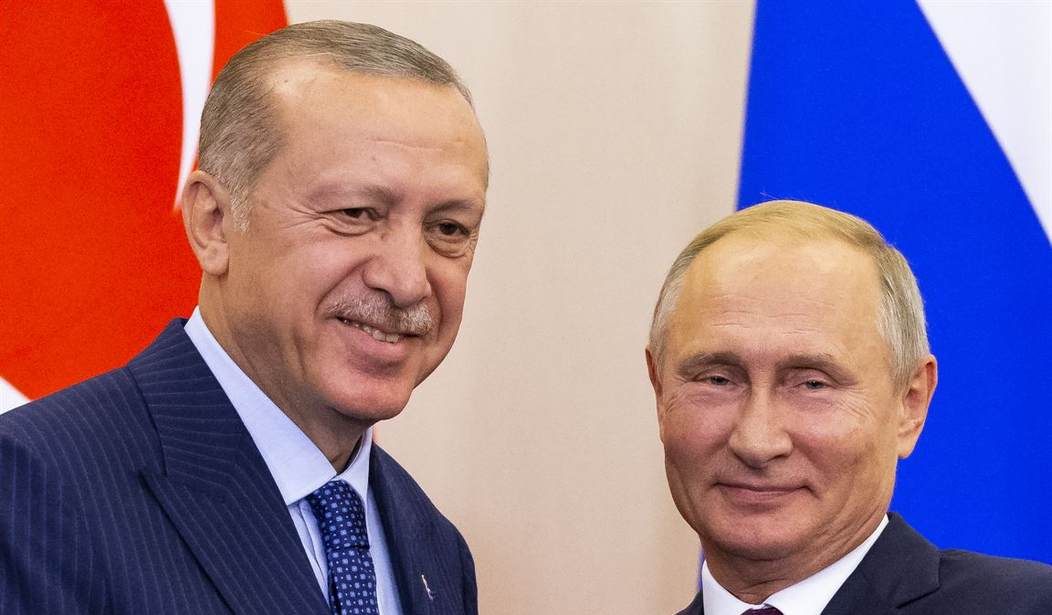Russia’s ability to move its naval forces into position to expand its invasion of Ukraine may have taken a significant hit last night. Despite recent moves to warm up their relationship with the Russians, Turkey suddenly announced that it was closing the Bosphorus and Dardanelles straits to the passage of any warships from any country until further notice. Those two straights are the only route for naval vessels to pass from the Mediterranean Sea into the Black Sea and reach both Ukraine and the Crimean Peninsula. Since both straits are fully within Turkey’s territorial waters, they should have the right to make that decision, but whether or not they can actually stop the passage of Russian naval vessels remains to be seen. (The Drive)
Turkish President Recep Tayyip Erdogan and Turkey’s Foreign Minister Mevlut Cavusoglu both confirmed the closure of the Bosphorus and the Dardanelles to warship from any country, citing provisions in the 1936 Montreaux Convention, in separate remarks this evening. Cavusoglu had indicated that a formal decision on this matter was imminent late yesterday, which came a day after Ukrainian President Volodymyr Zelensky had Tweeted out his thanks for Turkish authorities taking this step.
“When Turkey is not a belligerent in the conflict, it has the authority to restrict the passage of the warring states’ warships across the straits,” Cavusoglu said. Yesterday, he stressed that the Turkish government’s position was that what has been happening in Ukraine is a “war” rather than a “conflict,” a difference in language that matters when it comes to the Montreaux Convention.
The international politics at play here are interesting, as is the legal basis for Turkey’s decision. They are citing a nearly 90-year-old agreement, the Montreaux Convention, as the basis for their right to close off the straits. But it was quickly pointed out that the convention in question contains a provision providing special rights to the vessels of nations that have their own port or ports on the Black Sea. Since Russia controls Crimea, any ships “returning to port” there from the Mediterranean are supposed to be allowed to pass. Whether they actually go to port or turn to attack Ukraine is beyond the Turks’ control once they pass through.
Turkish President Recep Tayyip Erdogan appears to be trying to play both sides of the table in this game. I’ve been pointing out for some time now that Turkey has been edging closer and closer to becoming an official member of the New Axis of Evil in recent years. He’s been cozying up to Russia and Putin specifically for a while now, going so far as to purchase Russian missile systems that are not compatible with NATO weapons systems, potentially exposing details of American military hardware to Russia. This has led to the cancellation of contracts with Turkey to purchase some of our advanced fighter jets.
In his statement about the closing of the straits, Erdogan tried to assure everyone that he wasn’t taking sides. He declared that he would “not abandon ties” with either Ukraine or Russia, but only sought to “prevent the current crisis from further escalating.” His supposed efforts at playing the peacemaker in this confrontation are both dubious in intention and a bit late to be effective, however.
This may not be a case where Turkey can simply stay on the sidelines in terms of picking sides. They could have chosen to remain silent and let the conflict play out, but if they are going to try to block the straits, they are clearly taking a side. (Or at least Putin will almost certainly see it that way.) Blocking Russian warships from entering doesn’t do a thing to hurt Ukraine and it arguably helps them. But it does impact Putin’s ability to move his military chess pieces around the board, so he won’t be happy about it.
The Russians will likely be able to just sail through the straits anyway, citing the provision in the agreement I mentioned above. Turkey clearly won’t try to physically block the straits with their own ships, risking a collision or even an armed escalation with Russia in the process. Given the current state of play, however, if Turkey is forced to choose sides, this might be an ideal time for Erdogan to start mending his fences with the rest of NATO and acting like a trusted partner again. Siding with Russia could put the Turkish leader in a very lonely position.








Join the conversation as a VIP Member